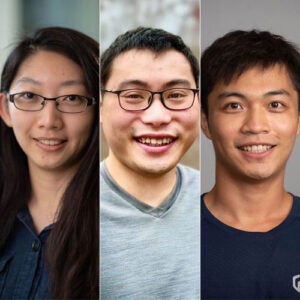
(left to right) Huilun (Helen) Wang, PhD, Liangguang (Leo) Lin, PhD, and Jason Zexin Li
Protein homeostasis in the endoplasmic reticulum (ER) is important for human health and disease. For the past decade, the Qi laboratory at Department of Molecular Physiology and Biological Physics has been dedicated to studying one of the most conserved ER protein degradation machinery – SEL1L-HRD1 ER-Associated Degradation (ERAD) – using mouse models. In two recent studies published in Journal of Clinical Investigation (Hypomorphic variants of SEL1L-HRD1 ER-associated degradation are associated with neurodevelopmental disorders, and Biallelic Cys141Tyr variant of SEL1L is associated with neurodevelopmental disorders, agammaglobulinemia and premature death), they reported the identification of 11 human patients carrying variants in the SEL1L-HRD1 ERAD protein complex, for the first time, shedding lights on the potential pathological importance of SEL1L-HRD1 ERAD dysfunction in human neurological disorders. These patients present a group of invariable symptoms, including infantile onset intellectual disability, developmental retardation, and locomotor dysfunction, termed ERAD-associated neurodevelopmental disorders with onset in infancy (ENDI). Notably, a group of Slovakian patients also displayed agammaglobulinemia (a condition characterized by low or absent B cells with absent immunoglobulins) and experienced premature death, further underscoring the critical role of the SEL1L-HRD1 ERAD in immune function.
Co-first author on both studies, Research Associate Huilun (Helen) Wang, PhD, in the Qi laboratory emphasized the newfound significance of SEL1L-HRD1 in human neurodevelopment, stating, “We never realized how important SEL1L-HRD1 is during human neurodevelopment until we found these kids.”
Co-first author on both studies, Research Associate Liangguang (Leo) Lin, PhD, in the Qi laboratory pointed out that for the first time, the intricacies of this pathway have been linked to specific human pathologies, offering fresh perspectives on cellular biology.
Co-first author on one of the studies, Jason Zexin Li, a biophysics PhD candidate, in the Qi laboratory commented, “it is fascinating to receive the rigorous training in this group and be able to apply these tools to analyze real-life human diseases.”
These studies also mark a significant milestone for the Qi Group since their transition to UVA in August 2023. Dr. Ling Qi, Andrew P. Somlyo Distinguished Professor and Chair of the Department of Molecular Physiology and Biological Physics, expressed enthusiasm for the research community and collaborative environment at UVA, emphasizing their commitment to deepening the understanding of SEL1L-HRD1 ERAD, its role in human health and disorder, and more importantly, its translational potential in the clinic.
This discovery has opened up new avenues for research and potential treatments, offering hope to children affected by ENDI and their families. Further investigations into this pathway hold the promise of a brighter future for those grappling with these neurodevelopmental challenges.
Other authors on the two studies are Xianqiong Wei, PhD, Omar Askander, PhD, Gerarda Cappuccio, PhD, Mais O. Hashem, PhD, Laurence Hubert, PhD, Arnold Munnich, PhD, Mashael Alqahtani, PhD, Qi Pang, PhD, Margit Burmeister, PhD, You Lu, PhD, Karine Poirier, PhD, Clade Besmond, PhD, Shengyi Sun, PhD, Nicola Brunetti-Pierri, PhD, and Fowzan S. Alkuraya, PhD. The other study on the Slovakian patients was also contributed by Dennisa Weis, PhD, Katarina Kusikova, PhD, Peter Ciznar, PhD, Hermann Maximillian Wolf, PhD, Alexander Leiss-Piller, PhD, Zhihong Wang, PhD, Serge Weis, PhD, Katarina Skalicka, PhD, Gabriela Hrckova, PhD, Lubos Danisovic, PhD, Andrea Soltysova, PhD, Tingxuan Tina Yang, Rene Gunther Feichtinger, PhD, and Johannes Adalbert Mayr, PhD.
Filed Under: Research
